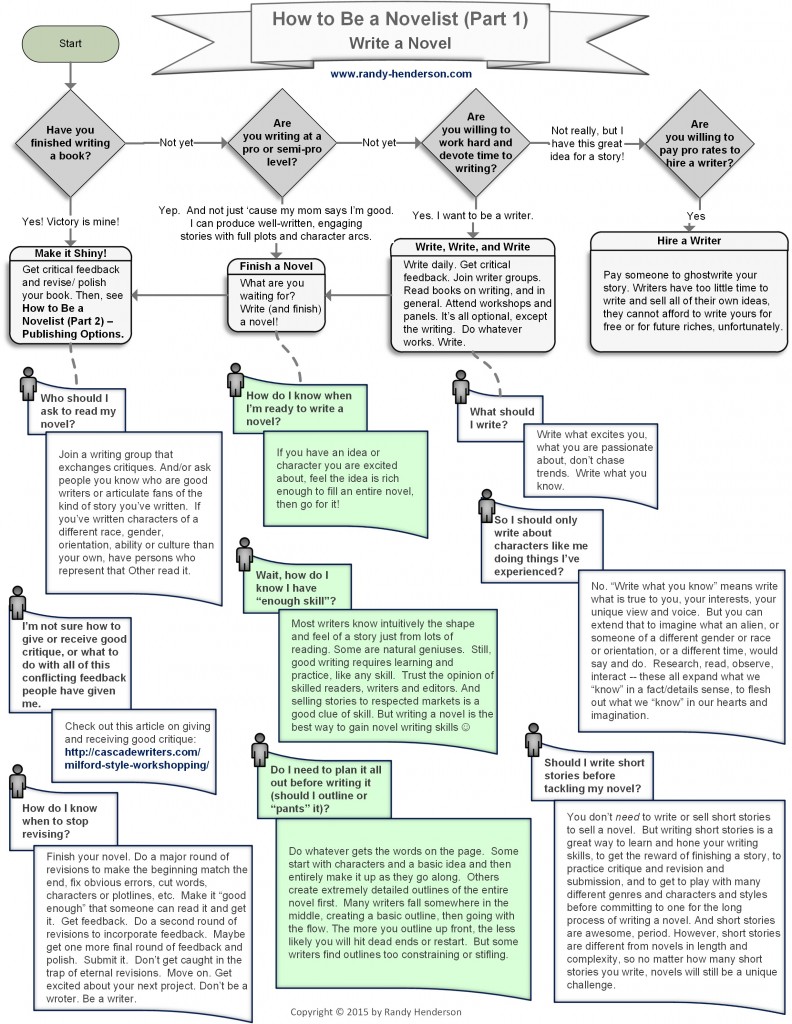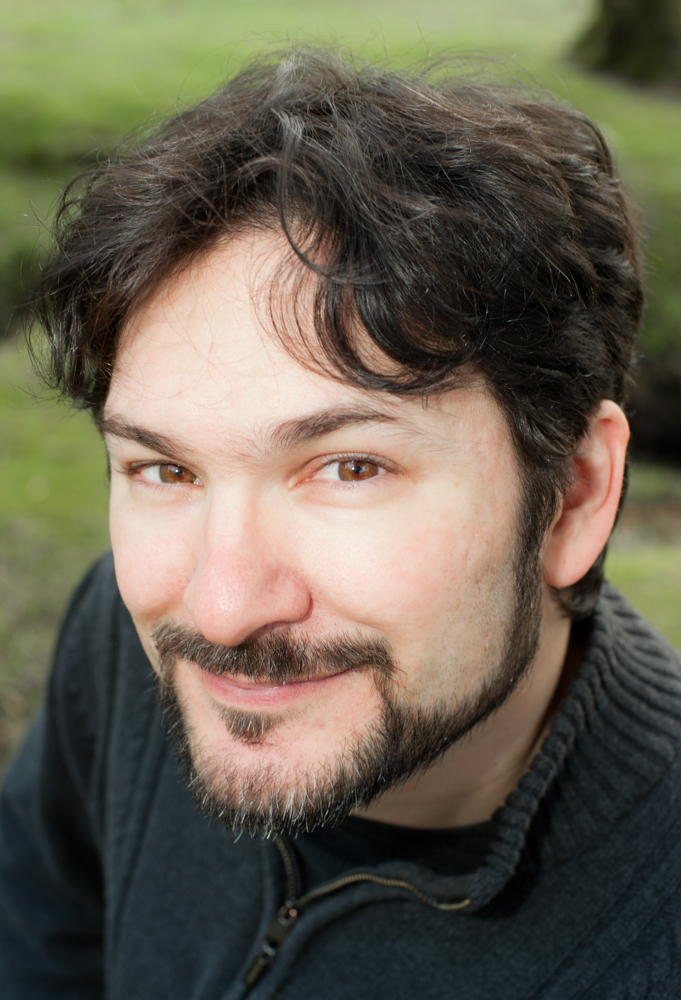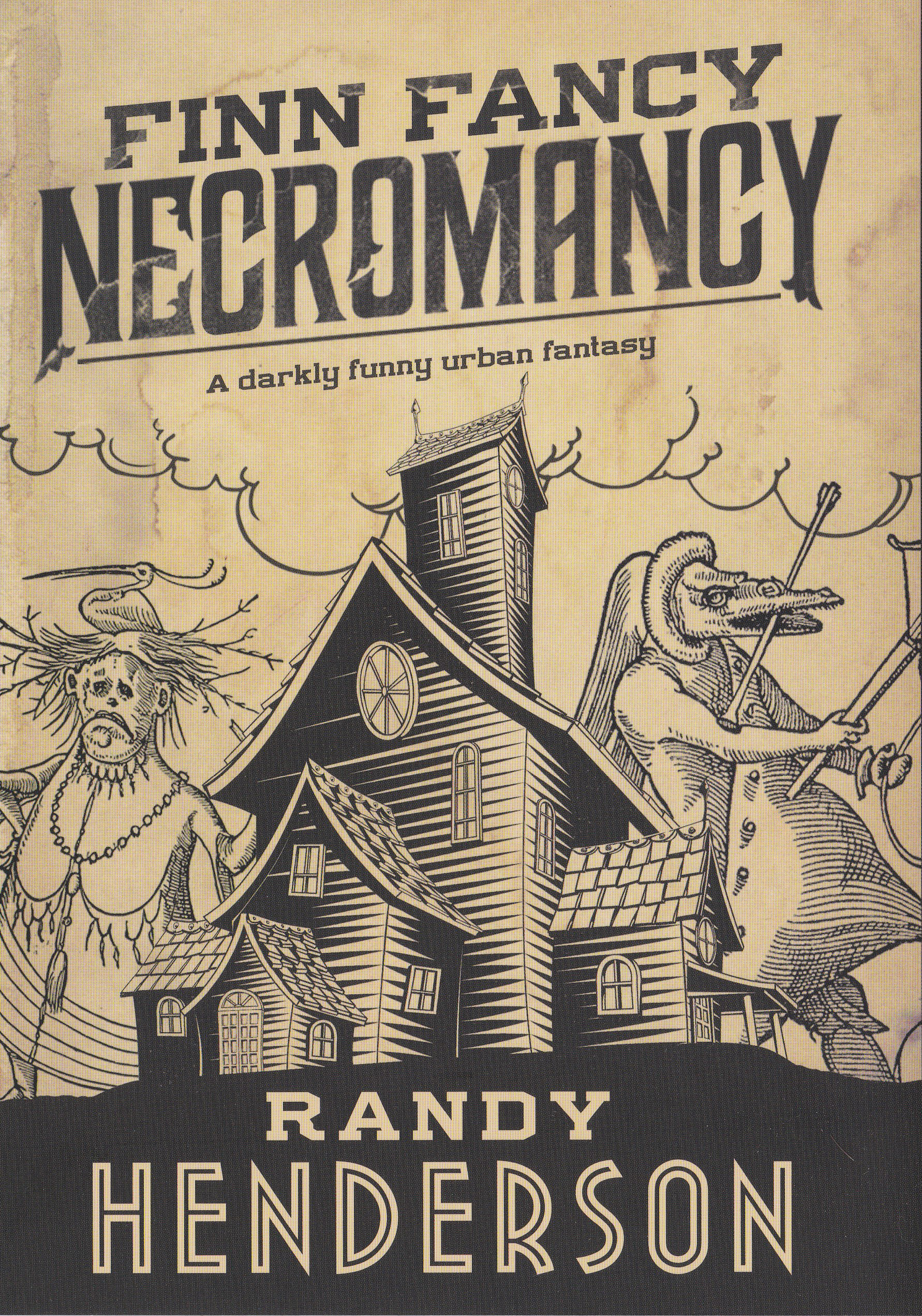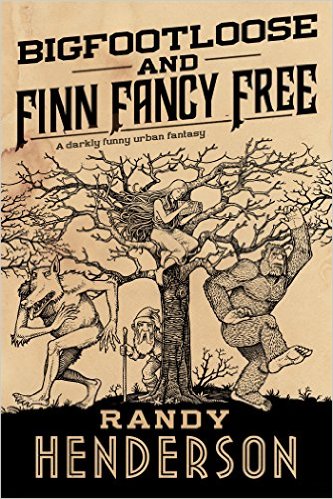Over the next couple of weeks I’ll be posting some info on how to become a novelist. Here’s the first, an infodumpographic and general Q&A on the first step — write a novel.
Why? Well, careful scientific studies have revealed that the number one reason for not having a novel published is, in fact, not finishing a novel. A lot of writers struggle to get past this step, but I hope this information helps.
How big is this mountain I must climb? (How long is a novel?)
Are we there yet? (How long does it take to write a novel?)
How many millions will I make from my books and movie deals?
Seems easy enough, you just … Oooo, cat videos!
Is a novel like a long short story?
1. HOW BIG IS THIS MOUNTAIN I MUST CLIMB? (How Long is a novel?)
- Writers and editors count book length in terms of words, not pages, so padding your margins and using a really big font won’t help. LAME!
- Average novel length is 75k-120k words, with YA being on the short end, and epic fantasy even longer, and authors who are “too big to fail” writing whatever the heck they want. I’m not saying Wheel of Time books 6-9 could have been seriously condensed, but … well, I guess I am saying that.
- Publishers tend to like an average of 90k – 100k for novels aimed at adults. Any bigger and they might cause concussions. And cost more to publish.
- Self-published “novels” can also be much shorter and priced cheaply. Some Urban Fantasy/ Paranormal Romance authors seem to do well, for example, publishing 25-40k novellas for low prices on an accelerated schedule, giving their readers new material on a frequent, regular basis rather than full sized novels a year apart. Also, sasquatch erotica is, I imagine, much like actual sasquatch loving — best taken in small doses.
Bottom line, take just as many words as you really need to tell the story you want to tell, in the way you want to tell it, no more, no less. And if it far exceeds the average size, consider splitting it, or take a hard look at what might be cut, or make sure the novel is so amazing that publishers will publish it anyway (based on independent and objective feedback, not your own unavoidably biased opinion).
^Top
2. ARE WE THERE YET? (How long does it take to write a novel?)
- About one year seems to be a typical goal for experienced authors with average schedule conflicts (work, family time, etc.). That includes planning, research, writing and revisions. But it varies wildly depending on the type and length of the novel, your writing speed, experience, and writing availability.
- A novel a year is also typical for novels in a series, or authors who are trying to build an audience who look forward to regular releases of new material. If you are writing on contract for a publisher, they often want a book a year.
- Many authors take multiple years per novel, however. Particularly for first novels, or complex novels, or if you just take whatever time you need to do it the way you want and get it right, like George R.R. Martin or Connie Willis.
- Children’s or YA novels may take less than a year. Work for hire novels, such as media tie ins, are also often given shorter deadlines such as 6 months to complete.
Again, bottom line, take whatever time you need (if not on contract). Just don’t let the challenges hold you back.
^Top
3. HOW MANY MILLIONS WILL I MAKE FROM MY BOOKS AND MOVIE DEALS?
Pop quiz: You are a published novelist, and walk into a Barnes & Noble. Do you wear a baseball cap and large sunglasses to avoid being recognized and swarmed by fans, or do you hire bodyguards with some of your novel riches? Answer: Ha ha ha ha (weeping).
If you are writing in the hopes of fame and riches, you are almost certainly going to be disappointed.
Very few authors can make a living writing. It is more often about the joy of writing and seeing others enjoy what you’ve written — certainly, if you want to avoid despair and disappointment, that is what you should be focused on.
But if you can write novels on a regular basis year after year, and sell thousands of each novel, then after maybe 5 novels it will all start to cumulatively add a nice bit of money to your bank account (about as much as a low-medium wage job, though potentially with far more hours).
Advances from major publishers for genre novels by new or emerging authors often range between $4,000 – $10,000 (usually on the lower end of that range) — and remember how can take years to write and sell a single novel?
Advances from small presses tend to be even less. If you self-publish, there are countless factors at play, but the number of self-published authors who make as much or more as traditionally published authors is small compared to the thousands who do not.
I’ll discuss more details of author income in my next post on publishing options.
^Top
4. SEEMS EASY ENOUGH, YOU JUST … OOOO, CAT VIDEOS!
There are a number of challenges to writing a novel that go beyond the obvious need to have a good idea and a general ability to write.
A) Procrastination — there’s obvious things to avoid when you should be writing, such as television and video games (which can be rewards after you’ve met your writing goals).
But you can also fool yourself by doing writerly things that are not writing, when you should be writing: “Research” during writing time (and no, playing Assassin’s Creed is not period research), “building your platform” on social media, managing submissions, rewriting an old story, and generally doing all the work around being a writer rather than writing. These things are all necessary, but in their right time (i.e., after you’ve written).
See my post on Brainergy and maximizing your writing time.
B) Self-doubt — Sometimes, the real reason for procrastination is a lack confidence. The writer keeps delaying to wait for “inspiration” or a better idea, or getting stuck because they don’t want to use up their “special” idea yet though it is the perfect one, or going back to rewrite what they’ve already written each time they learn some new lesson on writing (keep hitting the reset button and never reach the end of their novel).
This results in quitting out of frustration, or constantly reworking a story rather than moving forward and writing something new.
Just push through and finish the novel. You can go back and finish a flawed first draft once it is complete, but you can’t fix what you don’t write.
C) Hubris or denial — believing you don’t need to follow the general rules of what makes a good story or commercially viable novel. Believing you don’t need feedback or professional editing. Believing that the consistent feedback to change some major aspect of your novel is simply due to their inability to understand your genius.
Yes, you can experiment, and you should definitely avoid clichés and stereotypes, but you also first have to understand what works and why if you hope to experiment without creating a bad reading experience.
And don’t be afraid to seek out feedback on your work.
If you do not have a group of writers, editors and articulate readers you know and trust to provide feedback, then you can find local writer groups via sites like www.meetup.com, or classified ads. And there are online critique groups, such as the Science Fiction and Fantasy Online Writers Workshop.
Finally, learn how to give, receive, and use good critiques. You can see my post on How to Give and Receive Good Critique.
D) Chasing trends rather than your passions — Novels take time to write and sell. Trends change in the meantime. Most importantly, writing to someone else’s tastes makes writing feel more like hard work than writing to your own.
^Top
5. DON’T STOP BELIEVIN
Again, not finishing a novel is the number one cause for not having a published novel. So how do you keep the faith and keep writing, especially through the terrible middle of the novel, and all the setbacks or challenges?
A) Write what you love. Don’t write vampire YA because vampire YA is hot if you don’t absolutely love vampires, and YA. Write something you would be passionately excited to buy and read. That will help carry you through, will make the writing exciting for you, and will show in the results.
B) Remember that there is no better way to learn to write great novels than to write novels. Even if this novel doesn’t sell, it was not time wasted, any more than practicing piano or dancing for a year would be wasted. At the end of that year, you will be a better writer than when it began, and certainly know more about writing novels. Finishing a novel gives you practice at all parts of a novel. And of course it just might turn out as great and amazing as you hoped it would be when you started.
C) As soon as you finish your novel (well, after the happy dance), start working on your next project (and unless the novel is already sold, don’t make that next project a sequel to the novel you just finished unless you have a guaranteed publisher for it). Being excited about and invested in your next project is one of the best ways to ease the stress and pain of whether your last novel is going to sell or not.
D) Know Thyself. Set realistic writing goals that lead to small successes rather than failures. Strategize to avoid procrastination or despair. Write first; do revision, research, platform building etcetera when you can’t write/ after meeting writing goals. Read the last bit you wrote to prime yourself. Feel free to skip ahead to write a scene you’re excited about. Work on multiple projects and write what excites you now.
E) Perhaps it is time to move on. Sometimes, quitting is the best thing you can do if the novel really isn’t working out. It is hard to let go of something we’ve invested time and heart into, but are you really moving forward as a writer, or stuck in a quagmire? Just make sure you are quitting because you can’t move forward in a positive direction that might result in a publishable work, and are not just quitting because moving forward is hard.
^Top
6. IS A NOVEL LIKE A LONG SHORT STORY?
Yes and no. They differ in several ways:
A) Number of Characters and Plotlines
A short story should focus on one, maybe two main characters. And it should have one major plot, and sometimes a minor subplot that interweaves with the main plot.
A novel can have multiple Point of View characters or a large ensemble cast of characters from a single point of view, and can interweave multiple plotlines and subplots.
In both cases, it is always most satisfying when the subplots add emotional depth and tension to the main plotline, and come back to present a twist or clever resolution to the main plot.
B) Commitment and Test of Will/ Faith
You can write a short story in a day (though for most folks and most stories it takes longer). You quickly get the satisfaction of completing it, and can get feedback on it shortly thereafter. And if lucky, you can get it published fairly quickly, or at least collect the rejections quickly and move on.
A novel, as noted, can take a year or more to write, years to sell and see published (if you go the traditional route), and requires a greater commitment and willingness to risk writing something that may not sell. You will be living with the same characters and world and plotlines for a long time — perhaps a decade or more if it is a series or the Chronicles of the Codex of the Ology Wars (which is again a reason to write to your passions, not trends).
C) Flexibility to Experiment vs Ability to Dig Deep
Since short stories are so much less of an investment in time, you can risk greater experimentation. Try different styles and voices. Try different genres and subgenres. Practice writing characters of other races, genders, orientations, identities, abilities. Try first versus third person, past versus present tense, made up languages, etc. This experimentation will help you to find what you enjoy writing, and will make you better able to choose the best idea, voice and style, characters and setting for your novel.
With novels, on the other hand, you can really dig deep into the characters and the world you have chosen, spend time with them, and explore their natures and complexity in ways you cannot in a short story.
D) Length obviously, though this affects not just the word count, but also the period of time the story actually covers.
The extra characters and plotlines and ability to dig deep means more words, obviously. But novels may also span more time in a satisfying way that, in short stories, can lead to feeling ungrounded or unsatisfied.
Novels can span days or months or years, or even centuries. But short stories should typically take your character over the greatest emotional distance in the shortest amount of time, often a span of hours or days (with exceptions, of course).
E) Exploration of Themes and Metaphors and Deep Stuff Like That
A short story can often represent a single important theme or message. Novels can explore a theme from many sides, or multiple themes, with much more depth and subtlety and complexity. Don’t worry if you haven’t figured out the deep stuff up front though, you will often discover it in your own work as the story evolves or you go back and read the first draft.
7. I FINISHED! NOW WHAT?
Excellent question! And one I will answer in my next post, How to Become a Novelist part 2: Publishing Options
^Top
Feel free to leave comments and questions.













[…] written a novel? CONGRATULATIONS! So … now what? Did you make it as gooder as you can get it? Well […]
[…] it online. Granted, there are deeper considerations if you want to actually be successful in writing and publishing a book, but again, it is perhaps easier than at any time in the past to do […]